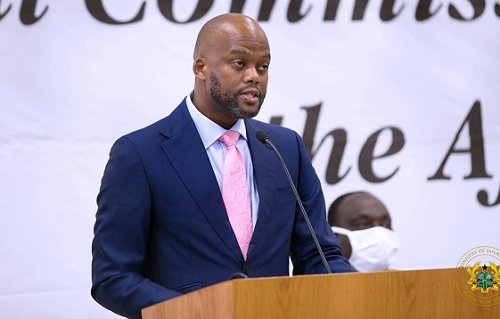
A DEPUTY Minister of Trade and Industry, Herbert Krapa, has said that the country was ready for the full operationalisation of the African Continental Free Trade Area (AfCFTA) agreement.
He said the customs unit of the Ghana Revenue Authority (GRA) was ready and had the competence to provide certificates of origin including all the requirements in place for the smooth take-off of the agreement.
“We have everything in place and we are part of the seven countries which have already traded under the Guided Trade Initiative,” he said in an interview on the sidelines of the 1st Annual General Assembly Meeting of the African Investment Promotion Agencies (IPAs).
Three years after the launch of the AfCFTA, African countries are yet to take full advantage of the agreement due to the inability of some countries to submit their tariff schedules to the AfCFTA Secretariat for technical validation.
The AfCFTA agreement when fully operationalised is expected to create a market size of over 1.4 billion people with a combined Gross Domesatic Product (GDP) of about $4 trillion.
It is also projected that Africa could see foreign direct investments increase by between 111 per cent and 159 per cent under the AfCFTA, with wages also expected to rise by 11.2 per cent for women and 9.8 per cent for men by 2035.
About 50 million people could also escape extreme poverty by 2035, and real income could rise by nine per cent; under deep integration, Africa’s exports to the rest of the world are also projected to go up by 32 per cent by 2035, with intra-African exports also growing by 109 per cent, led by manufactured goods.
Although these statistics make a good case for the need to fully operationalise AfCFTA, that is yet to happen.
Krapa, however, hinted that Ghana was not part of the countries delaying the full operationalisation of the agreement.
Support to private sector
The deputy minister also noted that the ministry was currently collecting data that would enable it to develop a special package for companies which sought to take advantage of AfCFTA.
He said the package, when ready, would be submitted to Cabinet for approval, then later to Parliament for approval.
Among other things, he said the package would consider areas such as the cost of power, cost of credit and cost of infrastructure.
He said the move was aimed at making Ghanaian companies more competitive on the continent.
We are paying attention to some of these things so that we will be able to take full advantage of the AfCFTA agreement,” he stated.
Unlocking Africa’s potential
In his opening remarks at the meeting, the CEO of the Ghana Investment Promotion Centre (GIPC), Yofi Grant, said AfCFTA held the key to unlocking Africa’s full potential when fully operationalised.
Africa accounts for just 2.3 per cent of global exports – with an export basket heavy on primary commodities and natural resources.
While only 16 per cent of the continent’s exports are destined for other African countries, much of this trade is in semi-processed and processed goods.
Grant said strengthening regional trade was, therefore, crucial to support greater value addition, diversifying supply chains, boosting resilience to crises and industrialising — ultimately contributing to job creation and better livelihoods on the continent.
In 2050, the African population will be one-fourth of the entire world population and I have a dream, a dream that keeps me up at night, a dream that has Africa being a recipient of one-fourth of Global FDI, is this dream possible? I say yes. It’s not only possible but inevitable,” he stated.
He said that dream was inevitable because Africa had 30 per cent of the world’s mineral reserves, eight per cent of natural gas reserves, 12 per cent of oil reserves, 90 per cent of the world’s chromium and platinum, 40 per cent of the world’s gold, and 65 per cent of the world’s arable land.

